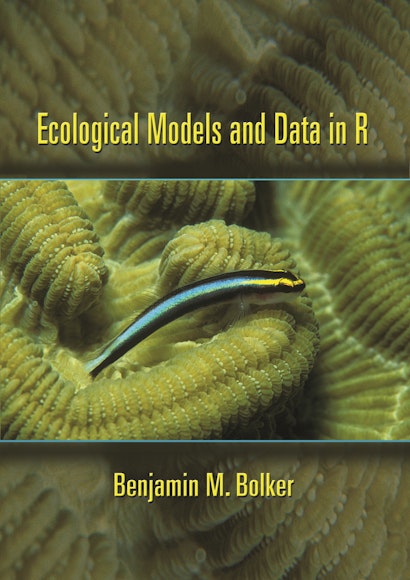Ecological Models and Data in R is the first truly practical introduction to modern statistical methods for ecology. In step-by-step detail, the book teaches ecology graduate students and researchers everything they need to know in order to use maximum likelihood, information-theoretic, and Bayesian techniques to analyze their own data using the programming language R. Drawing on extensive experience teaching these techniques to graduate students in ecology, Benjamin Bolker shows how to choose among and construct statistical models for data, estimate their parameters and confidence limits, and interpret the results. The book also covers statistical frameworks, the philosophy of statistical modeling, and critical mathematical functions and probability distributions. It requires no programming background—only basic calculus and statistics.
- Practical, beginner-friendly introduction to modern statistical techniques for ecology using the programming language R
- Step-by-step instructions for fitting models to messy, real-world data
- Balanced view of different statistical approaches
- Wide coverage of techniques—from simple (distribution fitting) to complex (state-space modeling)
- Techniques for data manipulation and graphical display
- Companion Web site with data and R code for all examples
Benjamin M. Bolker is a theoretical ecologist in the departments of Mathematics & Statistics and Biology at McMaster University.
"Bolker's book is a must-buy for anyone wanting to fit data to models and go beyond hypothesis testing, but it is certainly not an 'introductory' text in the sense of 'simple'. This book is a tour de force for anyone who studied ecology for his or her interest of nature's working. But it is the one single book that can propel the statistical novice to the cutting edge of statistical ecology—albeit with blood, sweat and tears."—Carsten F. Dormann, Basic and Applied Ecology
"[A] must for natural scientists and for statisticians who are interested in ecological applications. . . . Numerous enlightening footnotes, meaningful graphics and direct speech are evidence of substantial classroom experience of the author. . . . The book addresses students and researchers who have or have had some basic knowledge in ecology, mathematics and statistics. Delivering many examples and profound details on numerical aspects of maximum likelihood estimation, the book may also give a red line for a course in computational statistics."—Martin Schlather, Biometrical Journal
"[T]his book succeeds both in explaining how to analyze many types of ecological data, and in clearly describing the theoretical background behind some common analyses and approaches. I expect to refer to it often."—Lynda D. Prior, Austral Ecology
"This user-friendly introduction to likelihood and Bayesian statistical methods for ecology students is set apart by its emphasis on implementation in R. This alone will make it more useful than previous books. In contrast to other texts, Bolker's book explains how to fit models to data in enough detail that even students with little programming experience will be able to follow along. I expect this to become an exceedingly popular textbook."—Stephan B. Munch, Stony Brook University
"Benjamin Bolker is a pioneer in helping ecology students make the leap from a casual understanding of modern statistical methods to a hands-on application of these tools to their own precious data sets. This book shows the lessons learned from teaching this material to several cohorts of graduate students. No other book I've read gives such a good feel for the compromises scientists have to make in searching for good statistical models."—Brian Inouye, Florida State University
"I have no doubt that this book will become a fixture on many ecologists' bookshelves (it certainly will be on mine). With a presentation that is gentle and encouraging rather than jargon-filled and intimidating, it empowers ecologists to develop their own statistical procedures. I strongly recommend it."—Timothy Essington, University of Washington

